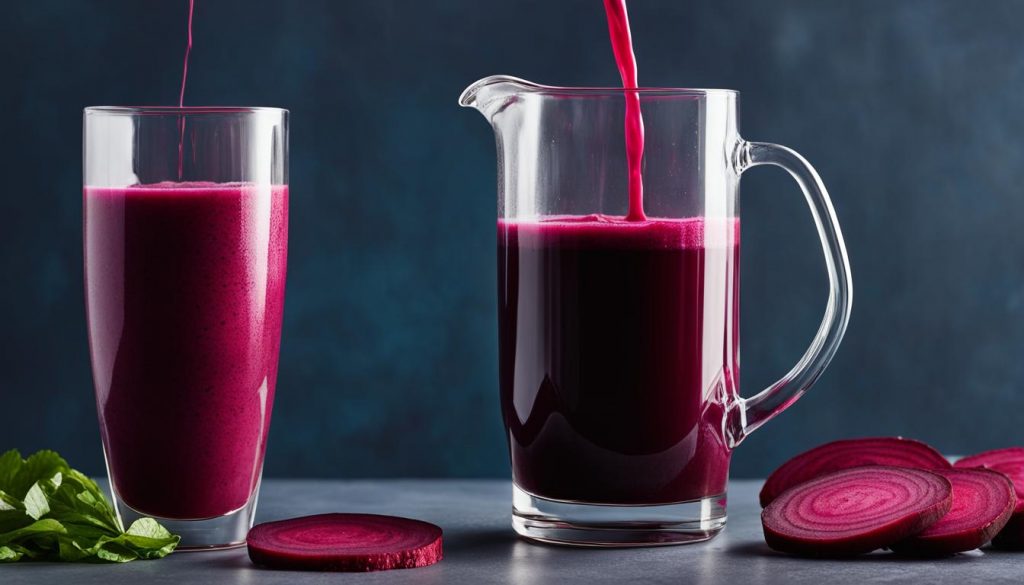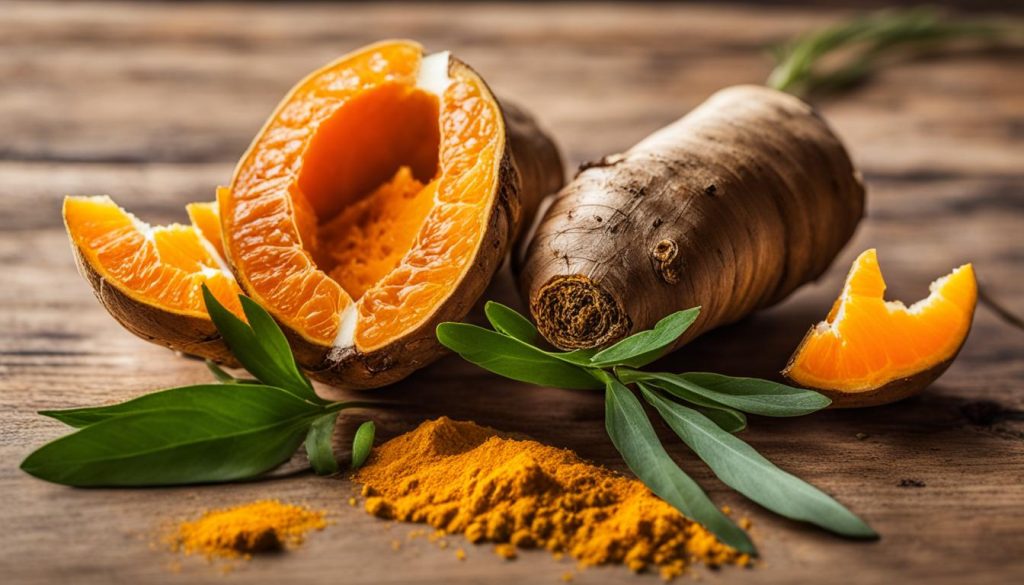Endurance athletes require proper nutrition and supplements to fully optimize their performance. Diet and exercise, while vital, can be complemented with supplements for heightened performance. This article delves into the top 10 supplements that can significantly improve endurance, recovery, and the general athletic performance of endurance athletes.
Key Takeaways:
- Carbohydrates, BCAAs, beetroot juice, beta-alanine, caffeine, L-glutamine, omega-3 fatty acids, sodium bicarbonate, turmeric, and whey protein are the top endurance supplements for peak performance.
- Carbohydrates provide essential fuel for endurance athletes and should come from natural sources like whole grains, beans, peas, and vegetables.
- BCAAs help with muscle recovery and can be found in fish and dairy products.
- Beetroot juice enhances endurance naturally with its nitrate content.
- Beta-alanine reduces fatigue and boosts performance by increasing carnosine levels in muscles.
Carbohydrates – Essential Fuel for Endurance
Carbohydrates play a vital role in fueling the performance of endurance athletes. These macronutrients provide the necessary energy for physical activity, making them a crucial component of any endurance training regimen. Natural foods that are rich in complex carbohydrates are particularly beneficial for endurance athletes, as they offer sustained energy and essential nutrients.
Complex carbohydrates are found in whole grains, beans, peas, and vegetables. These foods are a better choice than simple carbohydrates because they are digested and absorbed more slowly, resulting in a steady release of glucose into the bloodstream. This gradual release helps to regulate blood glucose levels and prevents the rapid spikes and crashes that can occur with simple carbohydrates.
Endurance athletes should prioritize consuming carbohydrates from natural sources to fuel their performance effectively. By incorporating complex carbohydrates into their diets, athletes can benefit from sustained energy levels, improved endurance, and enhanced recovery.
The Benefits of Complex Carbohydrates
Complex carbohydrates offer a range of benefits for endurance athletes:
- A steady release of energy: The slow digestion of complex carbohydrates provides a consistent source of fuel for the body, helping endurance athletes sustain energy levels during prolonged exercise.
- Regulated blood glucose levels: Complex carbohydrates help to stabilize blood sugar levels, reducing the risk of energy fluctuations, fatigue, and sugar cravings.
- Sustained endurance: By providing a steady supply of glucose to the muscles, complex carbohydrates support optimal performance, preventing premature fatigue and enhancing endurance.
- Essential nutrients: Natural foods rich in complex carbohydrates also provide other essential nutrients, such as fiber, vitamins, and minerals, which contribute to overall health and well-being.
Incorporating a variety of complex carbohydrates into the diet of an endurance athlete is essential for maintaining a balanced and nutritious eating plan. By including foods like whole wheat pasta, quinoa, sweet potatoes, and legumes, athletes can ensure they have the necessary fuel to perform at their best.
“Complex carbohydrates offer sustained energy and a range of essential nutrients, making them the ideal fuel source for endurance athletes.”
| Complex Carbohydrate Sources | Benefits |
|---|---|
| Whole grains (e.g., brown rice, whole wheat bread) | Rich in fiber, vitamins, and minerals |
| Legumes (e.g., beans, lentils, chickpeas) | High in protein and fiber |
| Vegetables (e.g., broccoli, spinach, carrots) | Provide antioxidants and essential nutrients |
| Fruits (e.g., bananas, oranges, berries) | Contain natural sugars and antioxidants |
BCAAs – Energy and Recovery for Muscles
BCAAs, which include valine, isoleucine, and leucine, are essential amino acids that play a crucial role in providing energy for muscles. These amino acids are found in fish and dairy products, making them easily accessible for athletes looking to supplement their diet.
While BCAAs are commonly associated with strength training and bodybuilding, they can also be beneficial for endurance athletes. One of the main benefits of BCAAs for endurance athletes is their ability to aid in muscle recovery. By reducing muscle damage, BCAAs contribute to faster recovery and improved overall performance.
The three amino acids, valine, isoleucine, and leucine, have unique functions that contribute to muscle recovery:
- Valine: Valine helps stimulate muscle protein synthesis and provides energy during exercise.
- Isoleucine: Isoleucine helps regulate blood sugar levels and enhance glucose uptake into muscles for energy production.
- Leucine: Leucine activates muscle protein synthesis and plays a crucial role in muscle repair and growth.
By incorporating BCAAs into their nutrition plan, endurance athletes can support muscle recovery and ultimately improve their overall performance. Whether consumed through food or supplementation, BCAAs can be a valuable addition to an athlete’s routine.
“BCAAs are not only important for strength athletes but also for endurance athletes. Their ability to aid in muscle recovery can have a significant impact on overall performance.” – Dr. Emily Stevens, Sports Nutrition Expert
Comparison of BCAAs
| BCAA | Valine | Isoleucine | Leucine |
|---|---|---|---|
| Function | Stimulates muscle protein synthesis and provides energy | Regulates blood sugar levels and enhances glucose uptake | Activates muscle protein synthesis, supports muscle repair and growth |
| Sources | Meat, fish, dairy products | Meat, fish, dairy products | Whey protein, meat, fish, dairy products |
BCAAs play a vital role in endurance training by providing energy for muscles and aiding in post-workout recovery. With their ability to reduce muscle damage and support overall muscle health, incorporating BCAAs into an athlete’s regimen can lead to improved performance and faster recovery.
Beetroot Juice – Enhancing Endurance Naturally
When it comes to enhancing endurance naturally, beetroot juice is a game-changer for athletes. Packed with nitrates, beetroot juice can significantly improve athletic performance, making it a staple for endurance athletes in sports like cycling, swimming, running, and triathlon.
The secret behind beetroot juice’s effectiveness lies in its high nitrate content. Nitrates are converted into nitric oxide in the body, which helps enhance the body’s ability to utilize oxygen. By increasing oxygen delivery to the muscles, beetroot juice can delay the onset of fatigue, allowing endurance athletes to push harder and perform at their best.
To incorporate beetroot juice into their training regimen, endurance athletes can drink it as a pre-workout or during exercise for a quick boost of energy and endurance. It is recommended to consume beetroot juice 2-3 hours before physical activity to allow the body to process and utilize the nitrates effectively.
For convenience, there are also beetroot juice supplements available in the market. These supplements offer a concentrated dose of nitrates, making it easier for athletes to reap the benefits without the need for juicing fresh beetroots.
It’s important to note that individual responses to beetroot juice may vary, and it’s always wise to consult with a healthcare professional or sports nutritionist before adding any new supplement to your routine. Monitoring how your body reacts to beetroot juice and adjusting the dosage accordingly can help optimize its benefits.

Beta-Alanine – Decreasing Fatigue and Boosting Performance
Beta-alanine is an essential amino acid that can significantly benefit endurance athletes looking to improve their performance and delay muscle fatigue. This amino acid, which is naturally found in poultry, fish, and meat, has been shown to increase carnosine levels in muscles.
Carnosine plays a crucial role in regulating acidity levels in the muscles during intense physical activity. By increasing carnosine levels, beta-alanine helps buffer lactic acid buildup, reducing muscle fatigue and allowing athletes to sustain high levels of performance for longer periods.
Beta-alanine is particularly advantageous for sports that involve intermittent efforts, such as hockey, where players must perform at high intensities for short bursts of time. By improving muscle endurance and delaying fatigue, beta-alanine enables athletes to maintain optimal performance throughout a match or game.
A proper supplementation routine that includes beta-alanine can have a notable impact on an athlete’s overall performance. By enhancing energy levels and reducing muscle fatigue, athletes can push their limits and achieve better results in their endurance training.
Benefits of Beta-Alanine for Endurance Athletes:
- Increased carnosine levels in muscles
- Reduced lactic acid buildup
- Enhanced muscle endurance
- Delayed muscle fatigue
If you’re an endurance athlete looking to optimize your performance and enhance your training, consider incorporating beta-alanine supplementation into your routine. Talk to a healthcare professional or sports nutritionist to determine the appropriate dosage and ensure it aligns with your specific needs and goals.
“Beta-alanine supplementation can be a game-changer for endurance athletes. By reducing lactic acid buildup and delaying muscle fatigue, athletes can perform at their best for longer periods, ultimately improving their overall performance and achieving their goals.”
Caffeine – Increasing Energy and Focus
Caffeine is a stimulant commonly found in coffee, tea, and energy drinks. It is well-known for its ability to increase energy levels and improve focus, making it a popular choice among athletes seeking an extra boost.
The consumption of caffeine has been shown to enhance cognitive function and improve physical performance. It stimulates the central nervous system, increasing alertness and reducing the perception of fatigue. For endurance athletes, this can be particularly advantageous during long training sessions or intense competitions.
The Benefits of Caffeine for Endurance Athletes
Endurance athletes can benefit from the stimulating effects of caffeine in multiple ways:
- Increased Energy: Caffeine acts as a natural energizer, helping athletes feel more awake, alert, and ready to take on physical challenges.
- Fatigue Reduction: By blocking adenosine receptors in the brain, caffeine reduces the perception of fatigue, allowing athletes to exert themselves for longer periods without feeling as tired.
- Improved Focus and Concentration: Caffeine enhances cognitive function, sharpening mental focus and concentration, which can be especially beneficial during the later stages of a grueling endurance event.
Optimal Caffeine Dosage for Endurance Athletes
The ideal caffeine dosage varies for each individual, considering factors such as body weight and tolerance. It is generally recommended to consume between 2mg to 6mg of caffeine per kilogram of body weight. Athletes should start with smaller doses and gradually increase to find their optimal intake without exceeding safe limits.
It is important to note that while caffeine can provide performance benefits, excessive consumption can result in negative effects such as restlessness, anxiety, and disrupted sleep patterns. Endurance athletes should be mindful of their caffeine intake and consider the timing of consumption to minimize potential side effects.
A Word of Caution
“While caffeine can be a valuable tool for enhancing energy and focus, it is essential for athletes to use it wisely. It is crucial to remember that caffeine is a stimulant and should not be relied upon as a substitute for proper rest, recovery, and nutrition.”
By incorporating caffeine into their training regimen responsibly, endurance athletes can harness its benefits to optimize their performance and achieve their goals.
L-Glutamine – Enhancing Energy and Recovery
L-Glutamine is an essential amino acid that plays a vital role in enhancing energy levels and promoting muscle recovery for endurance athletes. It is the most abundant amino acid in the body and is involved in various biochemical processes.
Low levels of L-Glutamine can have a detrimental effect on endurance athletes’ performance. When engaged in prolonged physical activity, the body’s demand for L-Glutamine increases, and if the levels are insufficient, it can lead to muscle breakdown and inflammation, hindering optimal performance.
Supplementing with L-Glutamine can provide numerous benefits to endurance athletes. By increasing energy levels, L-Glutamine helps athletes perform at higher intensities for longer durations. It aids in the replenishment of glycogen stores, the primary fuel source for muscles during prolonged exercise, thereby improving endurance.
In addition to its energy-enhancing properties, L-Glutamine also plays a crucial role in muscle recovery. Intense endurance training can cause muscle damage and oxidative stress. L-Glutamine helps reduce muscle soreness and promotes faster recovery by supporting protein synthesis and minimizing muscle breakdown.
Endurance athletes can incorporate L-Glutamine supplementation into their training regimen to optimize their performance and accelerate the recovery process. However, it is essential to consult with a healthcare professional or a registered dietitian before starting any new supplementation to determine the appropriate dosage and ensure it aligns with individual needs and goals.
To fully understand the benefits of L-Glutamine for endurance athletes, let’s take a closer look at how it enhances energy levels and aids in muscle recovery.
Enhancing Energy Levels
L-Glutamine is a critical fuel source for cells in the immune system, the gut, and certain organs. During periods of intense exercise, the body prioritizes the distribution of L-Glutamine to these areas, leaving less available for muscle tissue.
By supplementing with L-Glutamine, endurance athletes can help meet the increased demand for this amino acid during exercise. This allows the body to maintain optimal energy levels, preventing fatigue and improving performance.
Aiding in Muscle Recovery
Intense endurance training produces free radicals, which can lead to muscle damage and inflammation. L-Glutamine acts as an antioxidant, protecting muscles from oxidative stress and reducing exercise-induced muscle damage.
Furthermore, L-Glutamine supports the synthesis of essential proteins, such as glutathione, that play a crucial role in muscle repair and growth. By promoting protein synthesis and minimizing muscle breakdown, L-Glutamine aids in the recovery process, allowing endurance athletes to bounce back faster and train more effectively.
“L-Glutamine supplementation has proven to be beneficial in enhancing energy levels and promoting muscle recovery for endurance athletes.”
Omega-3 Fatty Acids – Reducing Inflammation and Accelerating Recovery
Omega-3 fatty acids are essential nutrients found in seafood, nuts, and plant oils. These fatty acids offer numerous health benefits, including reducing muscle inflammation and accelerating the recovery process. For endurance athletes, incorporating omega-3 fatty acids into their diet or through supplementation can help improve performance and overall athletic endurance.
One of the key advantages of omega-3 fatty acids is their anti-inflammatory properties. Endurance athletes often experience muscle inflammation due to the high-intensity nature of their training. This inflammation can impede the recovery process and hinder performance. Omega-3 fatty acids help alleviate muscle inflammation, allowing athletes to recover faster and train longer.
In addition to reducing inflammation, omega-3 fatty acids also contribute to the recovery process by promoting optimal muscle repair and regeneration. By repairing damaged muscle tissue more efficiently, athletes can accelerate their recovery and be ready for the next training session or competition.
Furthermore, omega-3 fatty acids have been shown to enhance overall endurance performance. Studies have indicated that these essential nutrients can improve cardiovascular function, increase the utilization of oxygen during exercise, and enhance muscular efficiency. This combination of benefits can lead to improved endurance capacity and better athletic performance for endurance athletes.
To incorporate omega-3 fatty acids into a training regimen, endurance athletes can focus on consuming foods rich in these nutrients or opt for omega-3 supplements. Seafood sources such as salmon, tuna, and sardines are excellent natural sources of omega-3 fatty acids. Nuts like walnuts and flaxseeds, as well as plant oils like flaxseed oil and chia seed oil, are also great options.
With the potential benefits of omega-3 fatty acids on muscle inflammation, recovery, and overall endurance, endurance athletes should consider incorporating these essential nutrients into their training and nutrition plan.
Key Points:
- Omega-3 fatty acids reduce muscle inflammation in endurance athletes.
- They accelerate the recovery process by promoting optimal muscle repair and regeneration.
- Omega-3 fatty acids enhance endurance performance by improving cardiovascular function and increasing oxygen utilization.
- Endurance athletes can consume seafood, nuts, and plant oils rich in omega-3 fatty acids or opt for supplements to ensure adequate intake.
Sodium Bicarbonate – Reducing Fatigue and Acid Build-up
Endurance athletes constantly push their bodies to the limit, and one common challenge they face is the build-up of acid in their muscles. This acid build-up can lead to fatigue and hinder performance. That’s where sodium bicarbonate, commonly known as baking soda, comes in.
Sodium bicarbonate is a versatile substance with various uses, and one of its benefits for endurance athletes is its ability to reduce the build-up of acid in the muscles. By neutralizing the acid, sodium bicarbonate helps delay fatigue and allows athletes to perform at their best for longer periods.
To experience the benefits of sodium bicarbonate, it’s recommended to take a dosage of 300 mL per kilogram of body weight. However, athletes should be mindful of potential side effects such as nausea and water retention. It’s always best to consult with a healthcare professional before incorporating sodium bicarbonate into your training regimen.
Despite the potential side effects, many endurance athletes have found sodium bicarbonate to be a valuable tool in their quest for improved performance. By reducing fatigue and acid build-up, sodium bicarbonate can give athletes that extra edge they need to push through tough workouts and races.
Turmeric – Reducing Fatigue and Improving Recovery
When it comes to enhancing endurance and facilitating muscle recovery, turmeric is a powerful natural ingredient that endurance athletes can benefit from. Turmeric is well-known for its numerous health benefits, including its ability to reduce muscle fatigue, soreness, and inflammation. By incorporating turmeric into their training regimen, endurance athletes can experience improved mobility and joint health, leading to enhanced performance.
Studies have shown that turmeric can provide similar effects to Ibuprofen, a common over-the-counter pain medication, but with fewer gastrointestinal side effects. This makes it a safer and more sustainable option for endurance athletes who need to recover quickly without compromising their digestive health.
To introduce turmeric into the diet, athletes can incorporate it into their meals or choose to take turmeric supplements. These supplements are available in pill or powder form, offering convenient options for athletes on the go.
“Turmeric has been a game-changer for me as an endurance athlete. Since incorporating turmeric into my recovery routine, I’ve noticed significant improvements in my overall performance and post-workout muscle recovery.” – Sarah Johnson, Marathon Runner
Benefits of Turmeric for Endurance Athletes
Turmeric offers a range of benefits that are particularly advantageous for endurance athletes:
- Reduces muscle fatigue and soreness
- Alleviates inflammation and speeds up recovery
- Improves joint health and mobility
- Enhances overall athletic performance
Overall, turmeric is a valuable addition to an endurance athlete’s arsenal of supplements. Its natural properties make it an effective and safe option for reducing muscle fatigue, promoting recovery, and optimizing endurance performance.
Turmeric Benefits for Endurance Athletes
| Benefits | Description |
|---|---|
| Reduces muscle fatigue and soreness | Turmeric aids in minimizing muscle fatigue and soreness, allowing endurance athletes to perform at their best. |
| Alleviates inflammation and speeds up recovery | The anti-inflammatory properties of turmeric help reduce inflammation in muscles, leading to faster recovery after intense workouts or competitions. |
| Improves joint health and mobility | Turmeric supports joint health, enhancing mobility and reducing the risk of injuries for endurance athletes. |
| Enhances overall athletic performance | By reducing fatigue and facilitating recovery, turmeric contributes to improved overall athletic performance for endurance athletes. |
With its proven benefits in reducing muscle fatigue, promoting recovery, and enhancing endurance performance, turmeric is a valuable supplement choice for all endurance athletes looking to optimize their training and achieve their goals.

Conclusion
In conclusion, incorporating the best supplements for endurance athletes into their training regimen can significantly improve performance, aid in recovery, and enhance overall endurance. The 10 recommended supplements – carbohydrates, BCAAs, beetroot juice, beta-alanine, caffeine, L-glutamine, omega-3 fatty acids, sodium bicarbonate, turmeric, and whey protein – offer a range of benefits to athletes.
Carbohydrates provide the essential fuel needed for endurance activities, while BCAAs help with muscle energy and recovery. Beetroot juice, with its high nitrate content, naturally enhances endurance performance. Beta-alanine reduces muscle fatigue and lactic acid buildup. Caffeine boosts energy levels and focus. L-glutamine aids in energy production and muscle recovery. Omega-3 fatty acids reduce inflammation and accelerate the recovery process.
Sodium bicarbonate helps decrease fatigue and acid build-up, while turmeric reduces muscle fatigue and improves recovery. Finally, whey protein provides essential amino acids for muscle repair and growth.
By combining these supplements with a proper diet and endurance training, athletes can unlock their full athletic potential, optimize performance, and achieve their fitness goals. Remember to consult a healthcare professional before starting any new supplement routine to ensure safety and effectiveness.
FAQ
What are the best supplements for endurance?
The best supplements for endurance include carbohydrates, BCAAs, beetroot juice, beta-alanine, caffeine, L-glutamine, omega-3 fatty acids, sodium bicarbonate, turmeric, and whey protein.
Why are carbohydrates important for endurance athletes?
Carbohydrates provide the necessary energy for physical activity and help regulate blood glucose levels. Natural foods rich in complex carbohydrates such as whole grains, beans, peas, and vegetables are ideal sources.
How do BCAAs benefit endurance athletes?
BCAAs (valine, isoleucine, and leucine) are essential amino acids that provide energy for muscles and aid in muscle recovery. They can be found in fish and dairy products.
How does beetroot juice enhance endurance?
Beetroot juice contains nitrates, which improve endurance by enhancing the body’s ability to utilize oxygen. It is beneficial for intense sports such as cycling, swimming, running, and triathlon.
How does beta-alanine help reduce fatigue?
Beta-alanine is an amino acid that increases carnosine levels in muscles, reducing lactic acid buildup and muscle fatigue. It is especially beneficial for sports with intermittent efforts like hockey.
What role does caffeine play in endurance performance?
Caffeine is a stimulant that increases energy levels and improves focus among athletes. The ideal dosage varies but generally ranges from 2mg to 6mg per kilogram of body weight.
How does L-glutamine aid in endurance performance?
L-glutamine is an amino acid that increases energy levels and aids in muscle recovery. Low levels of L-glutamine can lead to muscle breakdown and inflammation.
How do omega-3 fatty acids benefit endurance athletes?
Omega-3 fatty acids, found in seafood, nuts, and plant oils, have anti-inflammatory properties and accelerate the recovery process. They reduce muscle inflammation and improve endurance.
What is the role of sodium bicarbonate in endurance?
Sodium bicarbonate helps reduce the build-up of acid in the muscles, reducing fatigue. It can be beneficial for endurance athletes looking to improve performance and delay fatigue.
How does turmeric aid in endurance and recovery?
Turmeric reduces muscle fatigue, soreness, and inflammation. It improves mobility and joint health, making it beneficial for endurance athletes.
How can endurance athletes maximize their performance?
Endurance athletes can maximize their performance by incorporating the best supplements for endurance into their training regimen, along with a proper diet and training routine.



